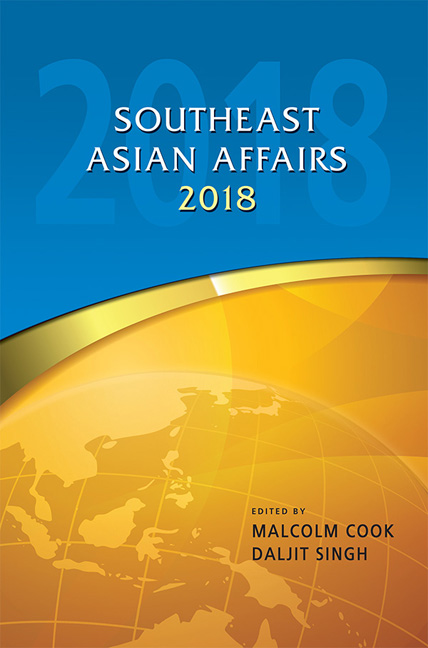Book contents
- Frontmatter
- Contents
- Introduction
- Acknowledgements
- THE REGION
- BRUNEI DARUSSALAM
- CAMBODIA
- INDONESIA
- LAOS
- MALAYSIA
- Johor and Traditionalist Islam: What This Means for Malaysia
- Malaysia in 2017: Strong Economic Growth amidst Intense Power Struggle
- MYANMAR
- THE PHILIPPINES
- SINGAPORE
- THAILAND
- TIMOR-LESTE
- VIETNAM
Johor and Traditionalist Islam: What This Means for Malaysia
from MALAYSIA
Published online by Cambridge University Press: 08 June 2019
- Frontmatter
- Contents
- Introduction
- Acknowledgements
- THE REGION
- BRUNEI DARUSSALAM
- CAMBODIA
- INDONESIA
- LAOS
- MALAYSIA
- Johor and Traditionalist Islam: What This Means for Malaysia
- Malaysia in 2017: Strong Economic Growth amidst Intense Power Struggle
- MYANMAR
- THE PHILIPPINES
- SINGAPORE
- THAILAND
- TIMOR-LESTE
- VIETNAM
Summary
In a survey conducted by the ISEAS – Yusof Ishak Institute in May–June 2017, one may be alarmed by the level of conservatism and exclusivism expressed by the Malay respondents living in Johor. For example, 89 per cent of the Malays believed that Malaysia is an Islamic state, and 75 per cent supported the implementation of hudud laws in Johor (punitive Islamic laws which include stoning, whipping and amputation as modes of punishment). One would expect those living in the rural states of Kelantan, Terengganu and Kedah, the states which were once governed by conservative Islamic party PAS (Islamic Party of Malaysia), to demonstrate such views. Yet, these sentiments were expressed by Malays residing in the highly urbanized, modern state of Johor, which is ruled by a religiously moderate sultan and the Malay nationalist party, UMNO (United Malays National Organisation). Moreover, observers have regarded Johor as a bastion of moderate, cultural and Sufi (spiritual) Islam. Is Johor experiencing a wave of Salafism-Wahhabism? In this chapter, I argue that Johor is not undergoing the Salafism-Wahhabism that may be experienced in some other Malaysian states; yet, this does not necessarily translate into a less exclusivist mode of thinking among the masses.
One has to go back a century to understand the nature of Islam practised in Johor, and how its religious elites have warded off influences from the Middle East. Historically, Islam in the state was tied to the royal courts, and Sufism was the dominant mode of orientation. In 1916, Haji Abdul Karim Amrullah, an Islamic religious scholar (ulama) from Sumatra, who was influenced by the reformist movement in the Middle East, made a sneering remark about the Mufti of Johor. “To become a Government Mufti in Malaya is a great glory”, he said. “You have an official uniform, with a whole banana-comb of epaulettes on the shoulder, a jubbah [Arabian-style garment] embroidered with gold thread, a silk turban, and your own car. The ra'ayat [people] fear and obey you, eat the scraps from your table, your spat of sireh [betel leaf]. And if you want to get married … Bismillah [anytime with God's consent].”
- Type
- Chapter
- Information
- Southeast Asian Affairs 2018 , pp. 187 - 200Publisher: ISEAS–Yusof Ishak InstitutePrint publication year: 2018



